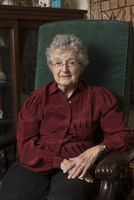On Writing, with M. Travis Lane
As review spaces shrink and authors and publishers struggle to find a place to engage critically with new writing, working critics have even more significance and weight attached to their reviews. It's a hefty responsibility and one that M. Travis Lane has taken on for nearly 50 years, as one of Canada's most prolific reviewers. An award-winning poet herself, she has reviewed the likes of Michael Ondaatje, George Elliott Clarke, Al Purdy, and many more.
Heart on Fist: Essays and Reviews 1970-2016 (Palimpsest Press) gathers Lane's finest and most influential reviews. Insightful, fearless, and often prescient, Lane's reviews act as a lens through which to view the modern history of Canadian Literature.
We're pleased to have M. Travis on Open Book today to discuss her incredible body of work and how Heart on Fist came to be. She tells us about what makes an effective review, being a woman in a historically male-dominated space, and her all-time most memorable reviews.
Open Book:
You've written hundreds of reviews of Canadian books over a decades-long career. What, in your opinion, makes a good book review? Are there things you don't like to see in a review?
M. Travis Lane:
What I like to see in a review is evidence that the reviewer has actually read the book, not just skimmed it. A few carefully chosen quotations to illustrate the reviewer's point, for example. What I do not like to see in a review are generalizations unbacked by references or quotations.
OB:
What was the process of looking back over your reviews like? How did you decide which pieces to include in Heart on Fist?
MTL:
I did not choose which pieces to include in Heart on Fist -- and was happy to leave the choice to my editor Shane Neilson. It was grand to reread them and remind myself of those books, some of which I had not reread for years.
OB:
Women have been underrepresented as both reviewers and reviewed writers, with organizations such as CWILA now working towards bringing gender balance to review culture. What is your experience and point of view in this vein?
MTL:
CWILA has been very helpful in provoking awareness of the gender imbalance-- particularly in drawing men's attention toward their tendency to ignore women's writing. I think that most women have less time to spend on their profession than most men (we still do most of the housekeeping, and children and old folk attending)-- I also think that many women are somewhat less confident about expressing their opinions than most men.
OB:
Tell us a little about where you worked on Heart on Fist. What does your writing space, if you have one, look like, and what does a typical writing day consist of?
Your CanLit News
Subscribe to Open Book’s newsletter to get local book events, literary content, writing tips, and more in your inbox
MTL:
My computer room is also the guest room and the bed is heaped high with unsorted papers, the walls lined with books, and the floor with things I am going to have to pick up and put away shortly. The computer is before the window with a good view across the valley. But I do most of my initial notes sitting in the living room with cats (now, dog and cat in the past) , tea, and flowers, writing on whatever scraps of paper I have remembered to keep by my reading chair. I am not sure I have a typical writing day, but am more likely to work on my writing in bad weather than in good weather. In good weather I want to be outdoors. I don't work to schedule but "get to it" when I feel like it. I do not support myself by writing, so always feel free not to. I write When I Have Something to Say-- a book to promote, or, perhaps, to disavow. But I can't review every good book I encounter-- I have so many other things I like to do -- so I tend to limit my reviews to books about which I can say something interesting.
OB:
Is there a particular review you've written that was most memorable for you? Or, were there any reviews that you came across in compiling Heart on Fist where you feel you might have responded differently now to those books?
MTL:
I think the review of Paulette Jiles's work, and of Judith Fitzgerald's, both included in Heart on Fist, are the most memorable because those were the most original of the writers that I have ever reviewed. The reviews selected for the collection all represent my considered opinion! "Je ne regrette rien."
OB:
What will you be working on next?
MTL:
I have just received a copy of Pat Keeney's Orphic Hymns, and find what she is doing in this book very interesting. I am also working on a collection of my own poetry.
_______________________________________________________
Educated at Vassar and Cornell, M. Travis Lane came with her family to Fredericton in 1960, where they became Canadian citizens. She is Honorary Research Associate with the Department of English at the University of New Brunswick and has been writing reviews for The Fiddlehead for half a century. Recognized as one of Atlantic Canada’s most important poets, she has received numerous awards, including the Atlantic Poetry Prize, the Bliss Carman Award, and the Pat Lowther Memorial Award. Her most recent book of poetry, Crossover, was shortlisted for the 2015 Governor General’s Literary Award.





